A donkey or Ass is a domesticated animal and a member of the horse family Equidae. However, the value of donkey farming, especially its milk for human welfare and its manure for crops, is still unknown to farmers.
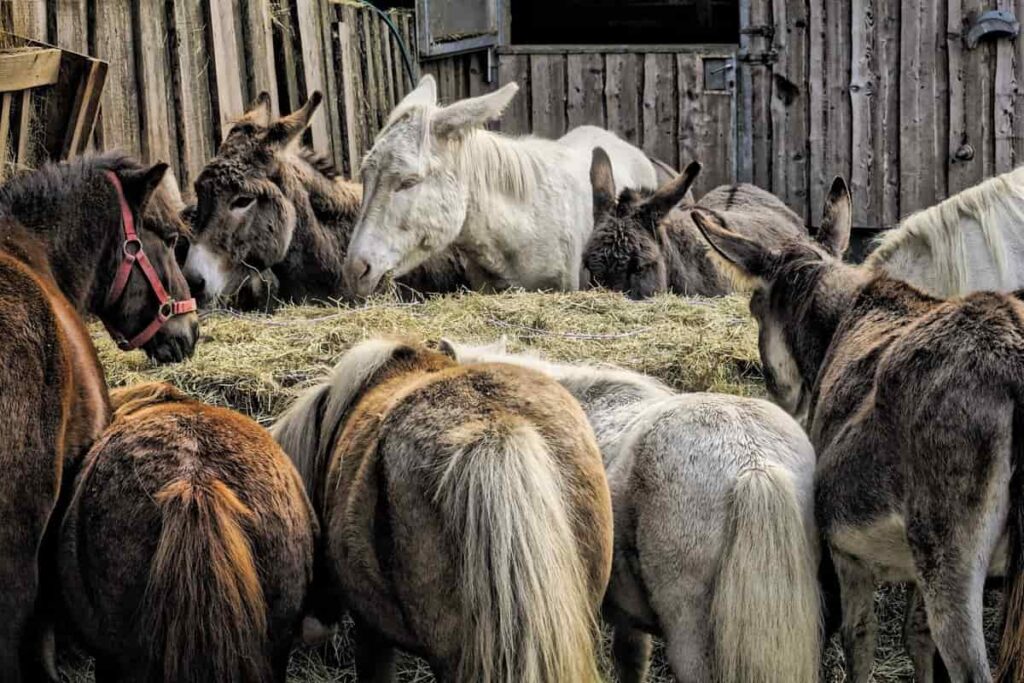
Donkey farming in India
Advantages of raising donkeys
- Donkeys provide a natural, cost-effective means of transporting things such as goods and are less expensive than horses. For example, they can carry hay, feed, and farming equipment on a farm. In general, donkeys are relatively healthy animals and require less veterinary care than performance horses.
- When people think of milk, the last thing they think of is donkey’s milk. Donkey milk is similar to breast milk, making it one of the healthiest milk you can find.
- Many livestock farmers have started raising donkeys on their farms, there are different reasons they want to raise them, but most of the farmers raise them for their production.
- Being more flexible than horse hooves, in addition to low maintenance costs, they boast versatility and efficiency compared to their more popular counterparts.
Housing management of donkey farming
When just starting to raise donkeys, the first thing you need to do is prepare the land and housing. Then, to raise donkeys, you need to build a suitable house for them. This shelter provides the donkeys with shade from the hot sun and keeps them warm in winter. A donkey house can be designed using wire, fencing hardware, and hay. And the house should be well-ventilated and kept clean. Believe it or not, donkeys are clean animals and don’t like to defecate in their pens, but that doesn’t mean you can’t help them.
Donkeys need shelter from the elements and may require additional measures in addition to the horse. Horses have evolved to have a water-repellent oil in their hair that better equips them for inclement weather. Donkeys evolved in dry and desert-like conditions where this trait was not essential, so they may need extra help to stay warm in inclement weather. To provide the best quality of welfare for donkeys and to keep them healthy, they need to be provided with 24-hour shelter and access to water.
In case you missed it: Dairy Farming Loan in India: Benefits, Banks, Interest Rate, Documents, and NABARD
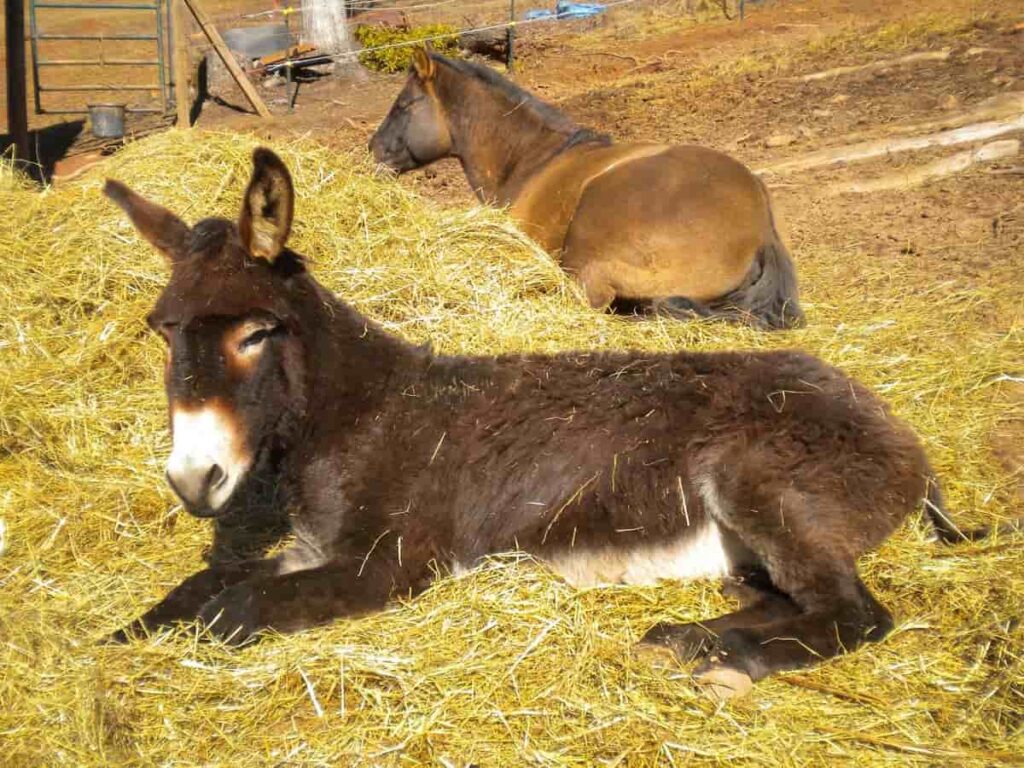
Shelter and space needed for donkey farming
Unlike horses, donkeys do not have natural grease to waterproof their coats and are born in warm climates. Therefore, they must always have access to a shelter or stable where they can hide from the elements. Providing a fully enclosed cover for areas with cold temperatures is recommended. Otherwise, a three-sided shade is fine. About 4.5 square meters per donkey is a good ratio. A dry place is always good for them if needed. These are animals that are meant to do hard work.
So, keeping them idle in one place can harm their health. Moreover, they must be bred and fed from time to time, requiring a larger land area than expected. However, people can start with a small plot of land if they are breeding a limited number of donkeys. However, if the herd is large, the ground should be large enough to allow space between each donkey rather than clustered them. They often need less space to graze than other cattle and horses as long as they can move around for exercise and have access to good grass.
Is the donkey milk business profitable?
And yes, a donkey farm is very profitable overall. The value of donkey farming, especially its milk for human welfare and its manure for crops is still unknown to farmers. Because the price of 1000 ml of donkey milk in the market is up to Rs. 2000 to Rs. 7000. Donkeys can carry 150 kg of goods and can move a distance of about 50 km without drinking water.
It can climb steep slopes and traverse rough roads with ease. But some people use the donkey for riding purposes and as a farm tool. Donkey is the most reliable means of transportation that can access any terrain. When used for cultivation, it can plow an acre of land in a day.
Best donkey breeds in India
There are 142 donkey farms in India; Aby Baby started the first donkey farm. Three distinct donkeys are available in India: Indian donkey, Indian wild, and Kiang. Gray is the dominant color but black, white, and even piebald colors are also seen. Kiang is available in Sikkim, Himachal Pradesh, and Ladakh and is dark reddish brown with white underparts. Different types of donkeys have not been diagnosed and characterized. The Halari breed of donkey is found in Gujarat, and its milk is an important ingredient in medicine.
Donkey milk cost
The price of 1000 ml of milk in the market is up to Rs. 2000 Rs. 7000. Milk is especially well-liked by parents of newborns as it is said to help boost immunity. Donkey milk often replaces mother’s milk in communities because it is just as nutritious. However, this milk has health benefits and others as well. Hence, donkey farming is a profitable agricultural business.
Donkey breeding and maintenance
Important maintenance is essential in breeding donkeys. The gestation period is 13-14 months. Female donkeys become adults at three months of age. Therefore, female donkeys are more valuable in the market. Always chewing the mouth and parallel hind legs are considered sufficient signs. A donkey can be weaned on the twentieth day of calving. One should drink milk keeping in mind their health. Donkeys should be breastfed for at least one month after calving.
In case you missed it: Goat Farming Loan in India: How to Get, Interest Rate, Documents for Banks, Mudra, and NABARD
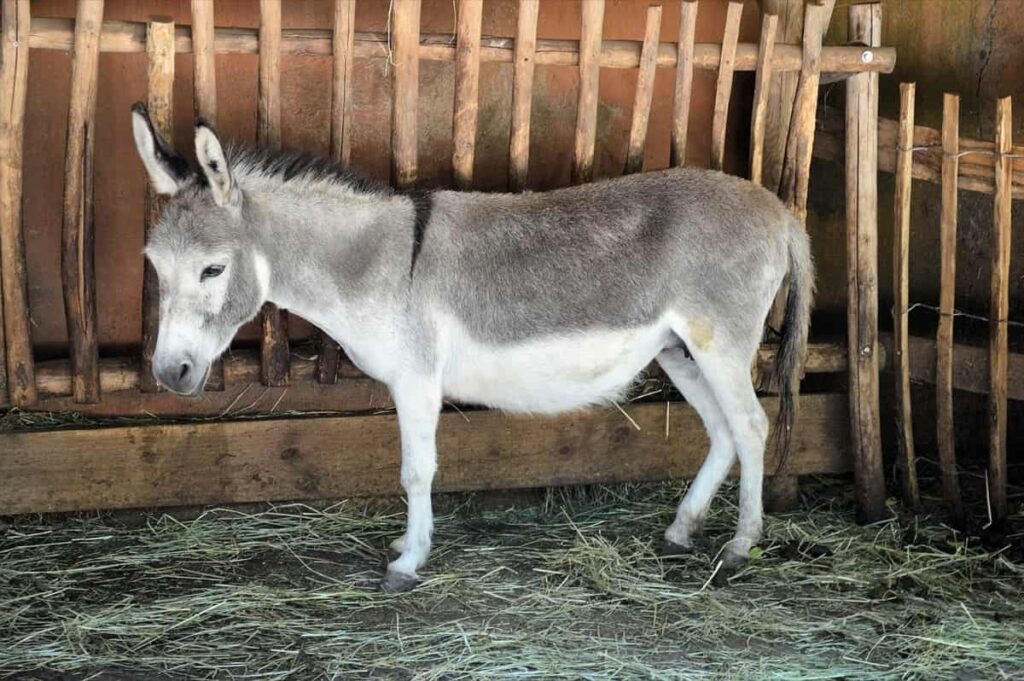
Donkey dung is an excellent organic fertilizer. Like donkey milk, donkey dung is also in high demand. Recognizing the infinite possibilities of the donkey will enable us to reach out to the larger world of business. Donkey milk production is very different from traditional dairy species, especially in milk supply which is much more limited. Therefore, donkeys should be milked thrice daily after 20 to 90 days. Variability in donkey milk production is caused by individual milk capacity, nutrition, genetics, reproductive management, etc., and lactation management.
Nutritional requirements for donkey farming
- Donkeys have constant access to shelter and water, a hazard-free environment that is safe and clean, and a low-sugar, high-fiber diet to maintain their best standards of welfare and health. In other words, donkeys need a diet high in fiber and low in calories, sugars, starch/carbohydrates, and protein.
- The main components of the donkey’s diet should be limited access to high-quality barley or oat straw and hay. A donkey can often consume 1.3% to 3.8% of its body weight in dry matter. It equates to 2 kg to 3 kg of dry matter per day for a 180 kg donkey.
- In general, donkeys rarely get sick. They are healthier than most horses and require less feed. While you should still feed high-quality hay, you won’t need to provide as much of it as the horse. Donkeys can be builders, so be careful of rich, green grass. Furthermore, they don’t care much about rain. A wet donkey can get sick and won’t be very happy. Straw (barley or wheat) is the most suitable method of providing low-energy feed in temperate climates.
- Feeding of fit, healthy donkeys should focus on providing high-fiber feedstuffs such as cereal straw (barley or wheat straw) or coarse, low-energy hay to provide “bulk” with high-energy fiber sources such as hay, grass, haylage, alfalfa, and beet pulp are being fed as needed according to body condition, life stage, and workload.
- Donkeys rarely need high-energy grains, sweet feed, or a lot of molasses products. As a result, feeding such products is poorly tolerated, often wasteful, and often associated with health problems such as laminitis, gastric ulceration, hyperlipemia, and the development of colic.
- Water is essential for all nutrients because, without it, life cannot last more than a few days or less under adverse conditions. Therefore, clean, fresh water should be freely available at all times. Donkeys are known for their thirst tolerance, which should not be confused with their water needs.
Raising donkeys for milk production
It has encouraged the establishment of new protected areas in regional and national parks aimed at sustainably rearing indigenous breeds to protect extensive agriculture and reduce the abandonment of rural areas. These areas, which include parks, reserves, and marginal areas, have an economy based primarily on agriculture, livestock production, and forestry. Therefore, to maintain and value this biodiversity, it is fundamental to conserve and reintroduce autochthonous species to these areas.
It can have positive implications for the preservation and conservation of the natural heritage of these areas. In this context, if properly managed, pastoral activity and semi-extensive donkey farming can positively impact biodiversity. Donkeys are grazers and browsers, their teeth and lips allowing them to graze close to the ground. Thus, they can efficiently graze short vegetation.
In addition, these animals are nonselective grazers, preferring shrubs, bushes, and other coarse vegetation over more palatable grasses. Thus, donkeys have the potential to control some invasive plant species and people with low appetites. Regarding milk production, it is well known that donkeys provide milk that shows the closest similarity to human milk.
Necessary vaccinations for donkeys
Some of the standard vaccines you can give your donkeys are rabies, EEE, WEE, WNV, and tetanus. It is the best thing to discuss this with your doctor. Also, deworm them 2 to 4 times a year, depending on weather conditions, such as rain and heat, causing more parasites. Donkeys not dewormed can develop a large internal parasite load, causing clinical symptoms such as rough hair, lethargy, diarrhea, colic, and potbelly.
To maintain the best standards of welfare and health, donkeys must have constant access to shelter and water, a hazard-free environment that is safe and clean, and be offered a low-sugar, high-fiber diet. In other words, donkeys need a diet high in fiber and low in calories, sugars, starch/carbohydrates, and protein. The main components of the donkey’s diet should be limited access to high-quality barley or oat straw and hay. You, too, can raise large, healthy, profitable donkeys if you only meet the specific needs of donkeys. Some of the basic things you will need to keep donkeys include:
- Three-way shelter or run-in barn
- Water and feed access
- Access to healthcare
In case you missed it: How to Solve the Challenges of Urban Agriculture/Farming/Gardening
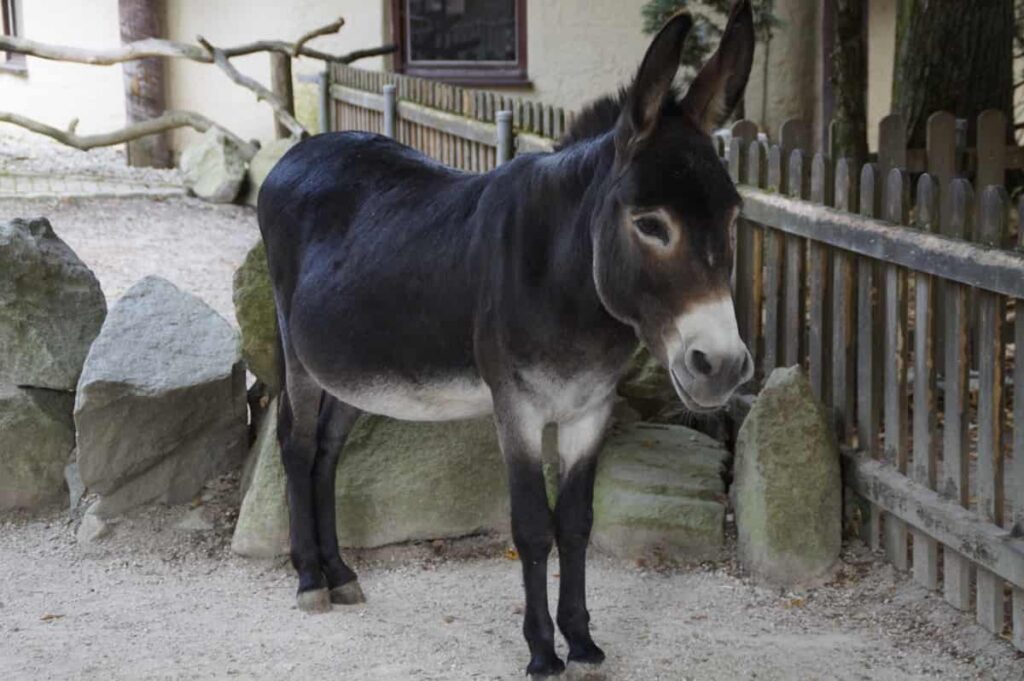
Good animal management practices for donkey milk production
Donkeys originated in environments where food supply was scarce and evolved as non-ruminant herbivores and hindgut fermenters. Donkeys are monogastric animals that digest food in a single stomach. The stomach and small intestine process starch, proteins, fats, vitamins, and minerals. The best thing to feed a donkey is grass or hay. Nutritionally, they will get most of what they need from this food source alone.
Additional supplements are not a major necessity. Feed them out of high nets or feed boxes to prevent them from overheating. Keeping donkeys is not difficult. Compared to horses, they can take much less care. They are more independent. As far as other farm animals go, they can still be handy. Their intelligence, spatial awareness, and protective nature make them great companion animals. They are unlikely to trip or injure others.
The cost of raising a donkey depends largely on how you decide to care for them. Investments in range shelters and expensive feed can increase costs. But no action is necessary. They are generally less expensive than horses. But the main reason is that they are small and their nutritional requirements are low. So, they don’t even need that much space. Things that can take in donkey farming include:
- Fencing
- Hay and storage
- Water tank and heating
- Stable or shed costs
- Vet and farrier fees
Tips for new donkey owners
They need friends
Whether with another donkey or a horse, all Grow in more companionship. They are social creatures who enjoy playing, eating, and sleeping near others. On the other hand, a single person can be very destructive. They can be fast, destroy fencing, act pushy or howl incessantly.
In case you missed it: Role of 5G Technology in Agriculture: How will it Change Future Farming
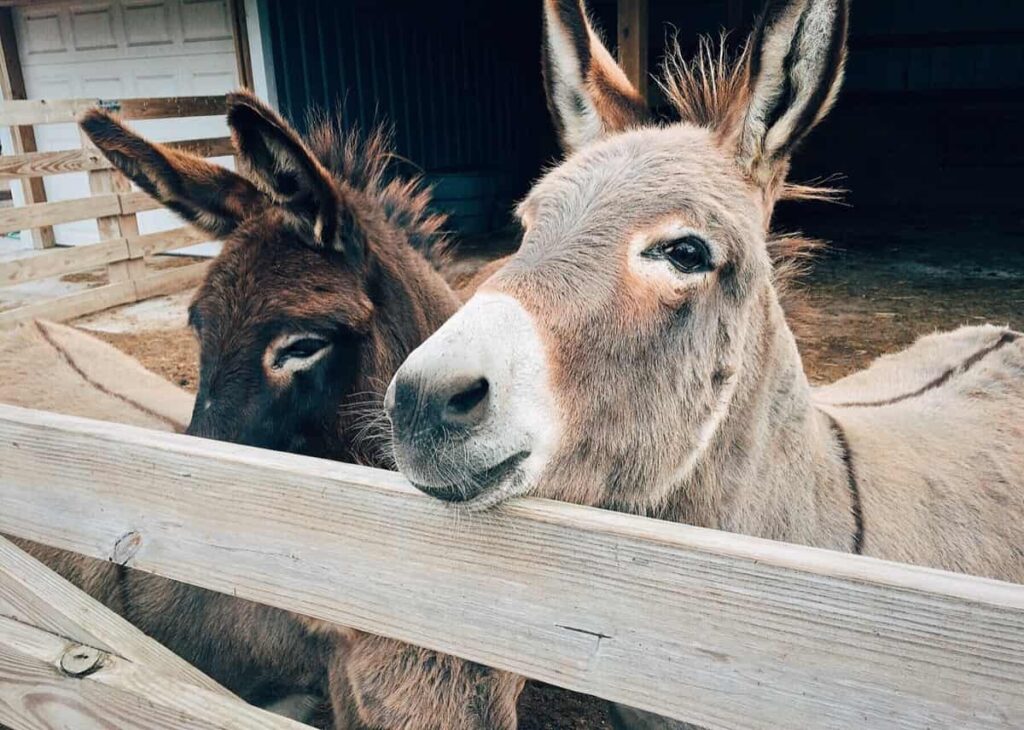
Adequate shelter
Your donkey is likely tougher than your horse. They usually do just fine with 24/7 turnout and no blankets. It would help if you offered a covered shelter, though. It can be an open stall or a three-sided run-in. Make sure your fence is secure too. It would be best if you never fenced your pasture with barbed wire but use wood, electricity, or netting instead.
Feed them properly
Unfortunately, they are prone to overeating. An overweight donkey will have fat deposits on its neck. They do best on high-fiber, low-protein hay. Most of them do not need grains. A slow feeder net can help reduce overweight donkeys. Additionally, clean drinking water should be offered at all times.
Keep them healthy
Your donkey will have different health needs. These include trimming their hooves, checking their teeth, deworming them, and giving them routine vaccinations. In addition, you should pay close attention to your donkey’s normal behavior, so you can recognize when they are acting up.
Training
These clever animals think differently than your average horse. They cannot be bullied into listening, but patience and kindness are the keys! Your donkey should know basic commands. It will make them easier to manage. It also stimulates their mind and keeps them active.
How much place does a donkey need to stay healthy?
Miniature donkeys can exercise and graze on 0.5 acres of land. Also, each donkey needs at least 50 square feet of shelter. Fencing is required to keep your donkey safe and secure but may also require mobility depending on your grazing setup and pasture management. Be careful when introducing new animals and remove or fence off anything that might cause injury. Always use an electric fence according to the manufacturer’s instructions.
Cost to set up donkey farm
The cost of raising donkeys depends on how much livestock you want to raise. Firstly, you must prepare the money to build a shelter and buy fodder for your donkeys. Rearing donkeys is important as their milk is highly valued in the market. The lifespan of a donkey is about 20 to 25 years. Feeding donkeys is much easier than livestock like cows and goats. Donkey milk is also used as a raw material in making expensive cosmetics.
However, even donkey dung is most sought after for its medicinal properties as its milk. Donkey milk (DM) costs about Rs. 5000 to Rs. 7000 per liter, urine fetches Rs. 500 to 600 per liter, and donkey dung (as organic manure) fetches Rs. 600 to Rs. 700 per kg. Therefore, as the demand for donkey milk is high and the supply is very low, donkey rearing will be a viable business for farmers.
In case you missed it: Ginger Farming Business Plan: A Guide to Production and Cultivation for Beginners
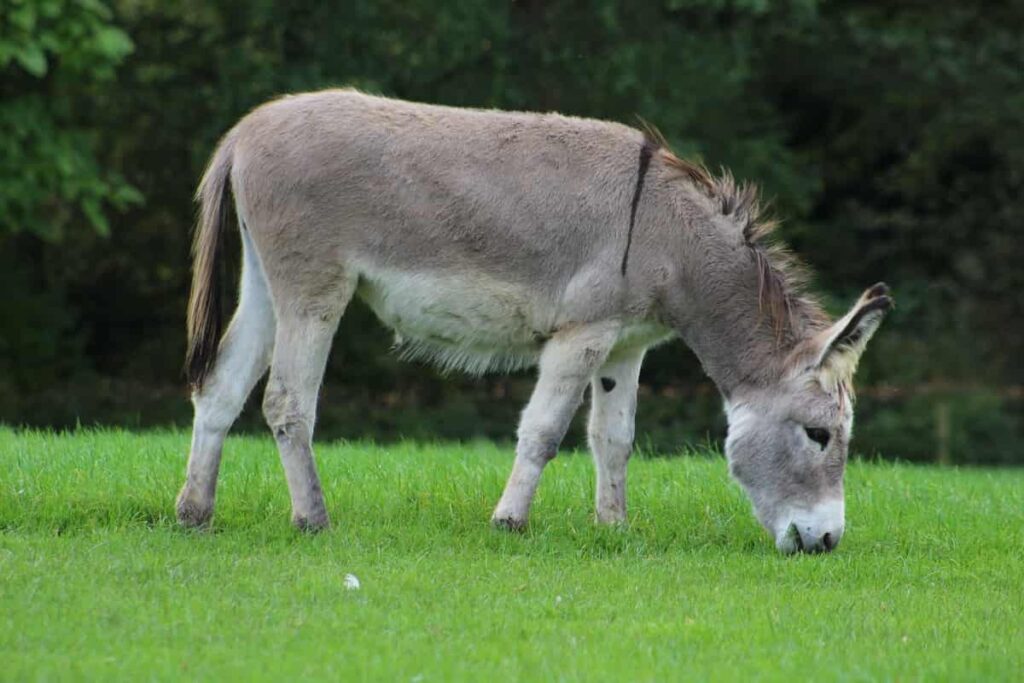
The price of a pair of adult females and calf is around Rs. 25000. A male will cost around Rs. 20000 to Rs. 25000. A simple shed 30 feet wide and 70 feet long will suffice to house the herd. It will cost around Rs. 50000 This small donkey farm will cost a total of Rs. 2.5 lakhs and donkeys will start giving financial returns from day one.
Conclusion
Donkey farming can be very profitable when done correctly. Like other forms of livestock farming, donkey production involves considerable investment and some risks. Donkeys also require daily attention to be successfully raised. However, donkeys are relatively easy keepers and generally do not cause too many problems on the farm. They don’t break fences, and they don’t need lush, grassy pastures.
Donkeys enjoy eating dry vegetation and can only thrive on grass. They require only limited grain, if at all, and eat significantly less than horses or cows.
- Economical Aquaculture: A Guide to Low-Budget Fish Farming
- 15 Common Planting Errors That Can Doom Your Fruit Trees
- How to Make Houseplants Bushy: Effective Tips and Ideas
- Innovative Strategies for Boosting Coconut Pollination and Yield
- Pollination Strategies for Maximum Pumpkin Yield
- The Complete Guide to Chicken Fattening: Strategies for Maximum Growth
- Natural Solutions for Tulip Problems: 100% Effective Remedies for Leaf and Bulb-Related Issues
- Revolutionizing Citrus Preservation: Towards a Healthier, Greener Future
- Natural Solutions for Peony Leaf and Flower Problems: 100% Effective Remedies
- Maximizing Profits with Avocado Contract Farming in India: A Comprehensive Guide
- Natural Solutions for Hydrangea Problems: 100% Effective Remedies for Leaf and Flowers
- The Ultimate Guide to Choosing the Perfect Foliage Friend: Bringing Life Indoors
- From Sunlight to Sustainability: 15 Ways to Use Solar Technology in Agriculture
- The Ultimate Guide to Dong Tao Chicken: Exploring from History to Raising
- The Eco-Friendly Makeover: How to Convert Your Unused Swimming Pool into a Fish Pond
- Mastering the Art of Delaware Chicken Farming: Essentials for Healthy Backyard Flocks
- 20 Best Homemade Fertilizers for Money Plant: DIY Recipes and Application Methods
- How to Craft a Comprehensive Free-Range Chicken Farming Business Plan
- Brighten Your Flock: Raising Easter Egger Chickens for Beauty and Bounty
- How to Optimize Your Poultry Egg Farm Business Plan with These Strategies
- Subsidy for Spirulina Cultivation: How Indian Government Schemes Encouraging Spirulina Farmers
- Ultimate Guide to Raising Dominique Chickens: Breeding, Feeding, Egg-Production, and Care
- Mastering the Art of Raising Jersey Giant Chickens: Care, Feeding, and More
- Ultimate Guide to Raising Legbar Chickens: Breeding, Farming Practices, Diet, Egg-Production
- How to Raise Welsummer Chickens: A Comprehensive Guide for Beginners
- How to Protect Indoor Plants in Winter: A Comprehensive Guide
- Ultimate Guide to Grow Bag Gardening: Tips, Tricks, and Planting Ideas for Urban Gardeners
- Guide to Lotus Cultivation: How to Propagate, Plant, Grow, Care, Cost, and Profit
- Agriculture Drone Subsidy Scheme: Government Kisan Subsidy, License, and How to Apply Online
- Ultimate Guide to Raising Araucana Chickens: Breed Profile, Farming Economics, Diet, and Care
- Bringing Hydroponics to Classroom: Importance, Benefits of Learning for School Students
- Ultimate Guide to Raising Polish Chickens: Breed Profile, Farming Economics, Diet, and Care
- Ultimate Guide to Raising Australorp Chickens: Profile, Farming Economics, Egg Production, Diet, and Care
- Silkie Chicken Farming: Raising Practices, Varieties, Egg Production, Diet, and Care
- Sussex Chicken Farming: Raising Practices, Varieties, Egg Production, Diet and Care
- Homemade Feed Formulations for Livestock: Discover Cost-effective Starter to Finisher Feed Recipes
I m interested in cow and donkey milk business. Can u arrange training for getting more knowledge?
Iam interested in donkey milk business,can u arrange training and purchase
Hello!!!
I need to know more about this as I am interested to do this donkey milk and farming buisness. So can you acknowledge me further….
I am interested in donkey farming, milk business. Can you arrange training and purchase
I am interested in your donky farming,milk project.can you arrange proper guidence, Currently I have 20female donky .
Sir, This is Venkata Ramana. I am very much interested to start donkey farming
I have gone through the Donkey milk farm thoroughly. And I am soon going to start building the Donkey farm. But I need buyers for the business continuity. Can you help?.
Hi Dear
I’m Very Interested the Donkey farming Can i get Guidence to Sales
Thanks..
I’m interested in doing donkey milk Business n donkey farming..pls let me about the training details….
I am interested in donkey farming/milk business. Please let me know the training, location, … details. Thanks!
I want to supply donkey milk please support me
I am interested
I am intrested in donkey farming, Please let me know the taining location details.
Hi, I am interested in donkey farming please help me in training and after establishing please suggest the market for the business.
I am interested in donkey farming so please let me know about farming and selling of Donkey milk.
Interested in live training for donkey farming, please let me know if you provide one
Interested in donkey farming and milk production with marketing leads
Kindly let me know , how can I sell donkey milk
I am interested to start Donkey farming. Kindly suggest me training center and storage and supply